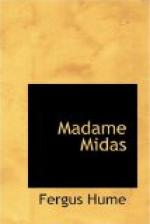she certainly would never have taken such trouble
over preserving it. She meets M. Vandeloup at
a ball, and, hearing that he is going to marry Mrs
Villiers, she loses her head completely, and threatens
to poison herself. M. Vandeloup tries to wrench
the poison from her, whereupon she flings it into the
garden. This bottle has disappeared, and the
presumption is that it was picked up. But if
the jury had any idea that the poison was administered
from the lost bottle, they might as well dismiss it
from their minds, as it was absurd to suppose such
an improbable thing could happen. In the first
place no one but M. Vandeloup and Miss Marchurst knew
what the contents were, and in the second place what
motive could anyone who picked it up have in poisoning
Mrs Villiers, and why should they adopt such an extraordinary
way of doing it, as Miss Marchurst asserted they did?
On the other hand, Miss Marchurst tells M. Vandeloup
that she still has some poison left, and that she
will kill Mrs Villiers sooner than see her married
to him. She declares to M. Vandeloup that she
will kill her, and leaves the house to go home with,
apparently, all the intention of doing so. She
comes home filled with all the furious rage of a jealous
woman, and enters Mrs Villiers’ room, and here
the jury will recall the evidence of Mrs Villiers,
who said Miss Marchurst did not know that the deceased
was sleeping with her. So when Miss Marchurst
entered the room, she naturally thought that Mrs Villiers
was by herself, and would, as a matter of course,
refrain from drawing the curtains and looking into
the bed, in case she should awaken her proposed victim.
There was a glass with drink on the table; she was
alone with Mrs Villiers, her heart filled with jealous
rage against a woman she thinks is her rival.
Her own room is a few steps away— what,
then, was easier for her than to go to her own room,
obtain the poison, and put it into the glass?
The jury will remember in the evidence of Mr Kilsip,
the bottle was three-quarters empty, which argued
some of it had been used. All the evidence against
Miss Marchurst was purely circumstantial, for if she
committed the crime, no human eye beheld her doing
so. But the presumption of her having done so,
in order to get rid of a successful rival, was very
strong, and the weight of evidence was dead against
her. The jury would, therefore, deliver their
verdict in accordance with the facts laid before them.
The jury retired, and the court was very much excited. Everyone was quite certain that Kitty was guilty, but there was a strong feeling against M. Vandeloup as having been in some measure the cause, though indirectly, of the crime. But that young gentleman, in accordance with his usual foresight, had left the court and gone straight home, as he had no wish to face a crowd of sullen faces, and perhaps worse. Madame Midas sat still in the court awaiting the return of the jury, with the calm face of a marble sphinx. But,




